Your product roadmap is packed, your development team has grown, and you’re searching for a project management tool that can keep up. Jira has long been the industry standard for agile teams, while Linear has emerged as a streamlined, modern alternative promising speed and focus. How do you choose between Linear and Jira? This comprehensive comparison examines Linear vs Jira in 2026—covering features, workflow styles, pricing, pros and cons, and time tracking. We’ll explore which tool suits different teams and how Everhour, a time tracking tool, fits into this conversation to help teams measure effort and keep projects on track.
What Is Linear vs Jira?
Both Linear and Jira help teams manage projects, but they serve different audiences and philosophies.
- 🔵 Developed by Atlassian, Jira is a project and issue tracking software used for agile development, IT, marketing, and project management. It supports Scrum and Kanban boards, backlogs, roadmaps, workflows, automation rules, and deep customization. It integrates with thousands of apps and supports large teams and complex processes.
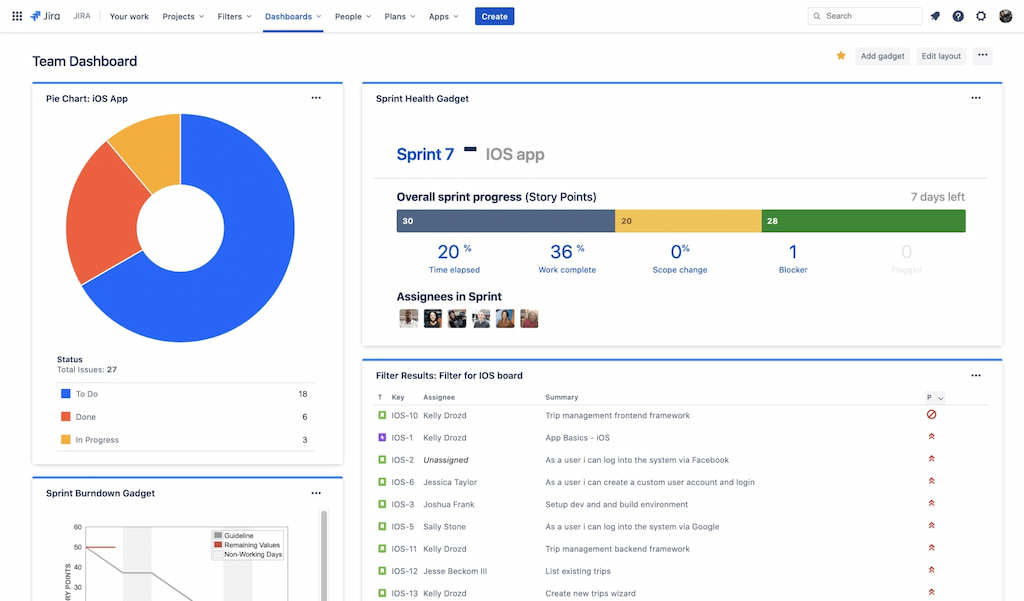
- 🟣 Launched in 2019, Linear app is a lightweight issue tracking tool designed for speed and simplicity. It emphasizes a clean user interface, keyboard shortcuts, offline support, and opinionated workflows. Linear uses the concept of “cycles” instead of sprints and offers features like roadmaps, issue templates, and global command search. Its goal is to help teams move quickly without getting bogged down in configuration.
- Learn how to use Linear in our guide!
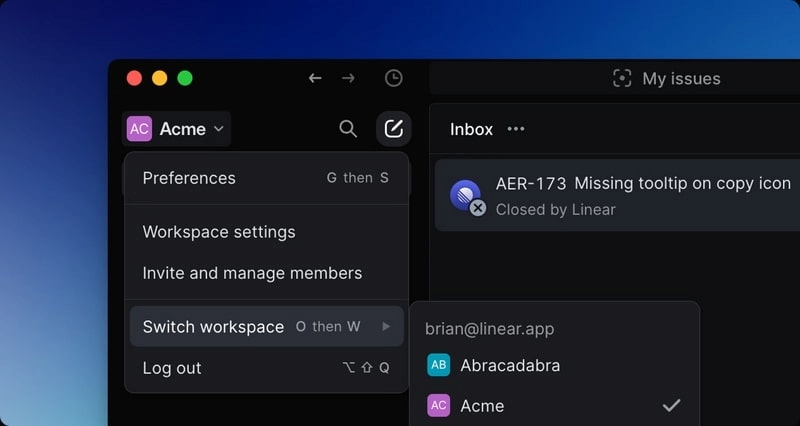
Both tools aim to help teams ship software, but they adopt different philosophies: Jira offers extreme flexibility; Linear focuses on streamlined workflows and speed.
Linear vs Jira: Feature and Plan Comparison
Task & issue management
Jira
- Custom issue types & workflows: Create stories, bugs, tasks, epics. Customize fields, statuses and transitions.
- Backlogs & boards: Jira sprints backlogs and Kanban boards. Adjustable columns, swimlanes.
- Roadmaps & epics: Plan work with epic & release roadmaps.
- Hierarchy: Epics > Stories > Subtasks.
- Automation: Rule-based automation (e.g., assign tasks, move issues based on conditions).
- Templates: Industry templates (software, service, marketing, HR).
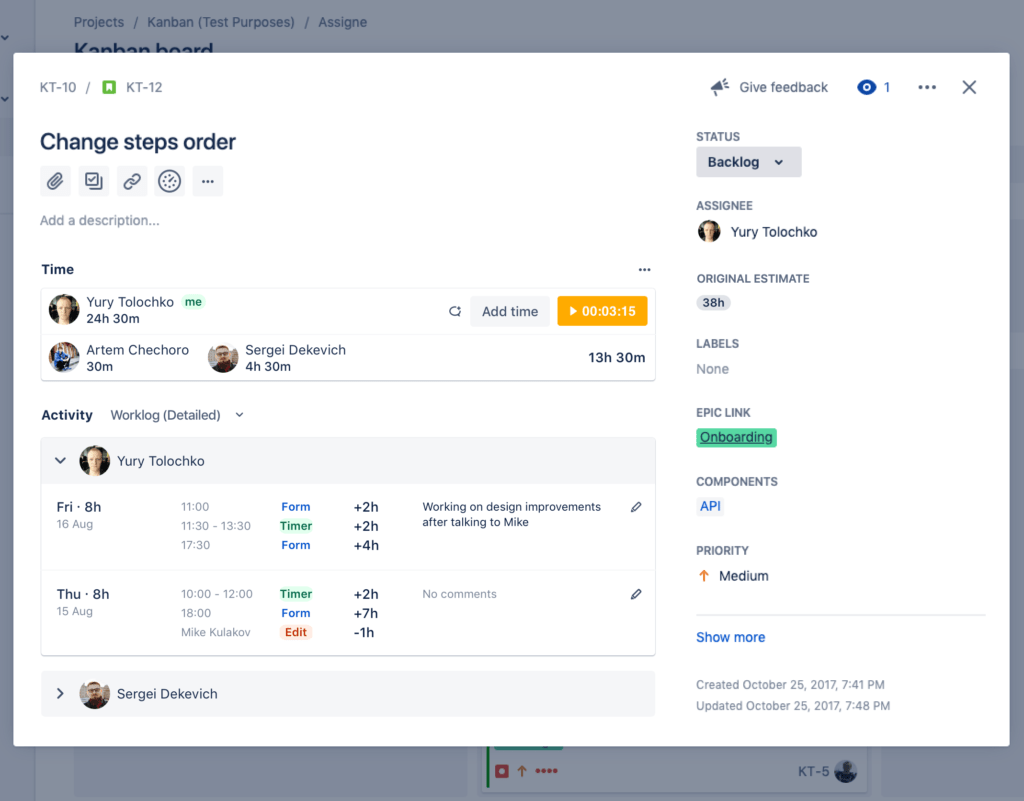
Linear
- Opinionated issue types: Default types—Issue, Project, Cycle. Cannot add custom fields.
- Cycles (Sprints): Two or four-week cycles with auto-rollover for incomplete issues.
- Roadmaps: Projects group issues; timeline view shows progress.
- Statuses & workflows: Predefined statuses (Todo, In Progress, Done). Minimal customization.
- Speed & shortcuts: Global search, command palette, offline support.
![why linear task management is ideal for product teams [2025]](https://blog-cdn.everhour.com/blog/wp-content/uploads/2025/09/linear-cycles-1024x568.jpg)
Verdict: Jira is infinitely customizable, suitable for complex or regulated environments. Linear suits teams that want to move fast and avoid overconfiguration. Lack of custom fields in Linear can be limiting for non‑developer teams.
Collaboration & comments
Jira
- Comments with mentions.
- Rich text and markdown formatting.
- Attach files, code snippets, and Figma embeds via apps.
- Notifications via email and Slack.
- Separate Jira Service Management portal for customer requests.
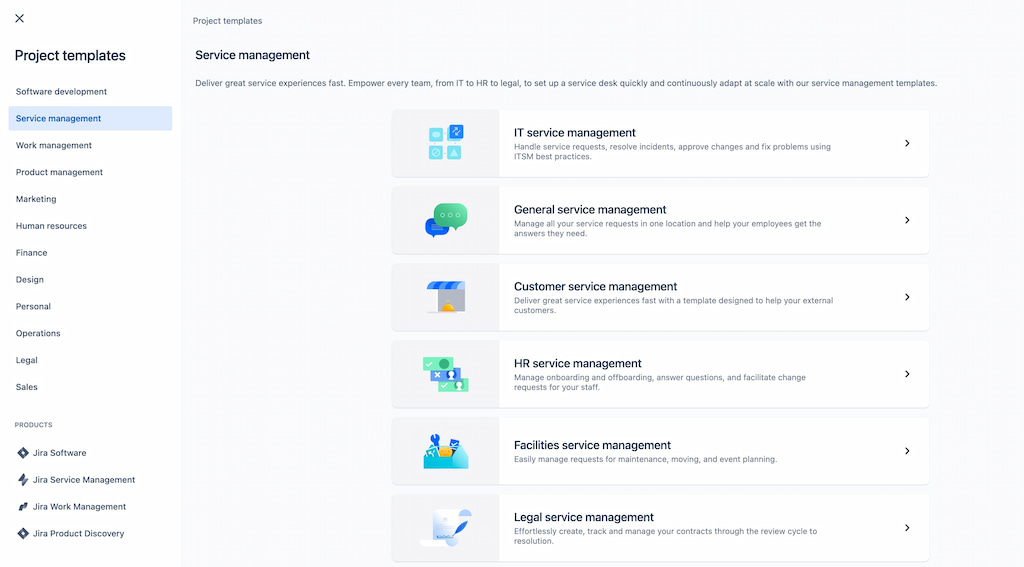
Linear
- Lightweight comments.
- Markdown support.
- Slack notifications.
- No customer-facing portal (third-party integrations available).
Verdict: Both support collaboration. Jira offers deeper integrations (Confluence, Figma). Linear’s comments are simple but adequate.
Reporting & analytics
Jira
- Burndown and velocity charts.
- Epic & version reports.
- Sprint reports with scope change indicators.
- Custom dashboards.
- Advanced Roadmaps (Premium) for capacity planning across multiple teams.
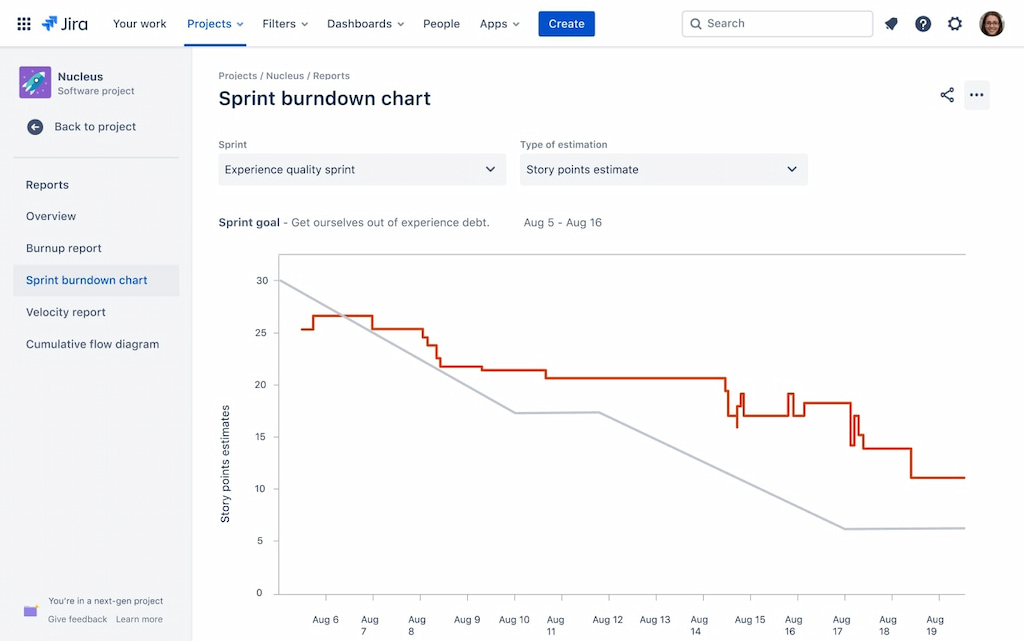
Linear
- Simple cycle progress charts.
- Roadmap timeline shows issue progress by team.
- Upcoming and overdue issues.
- No built-in velocity charts or complex analytics.
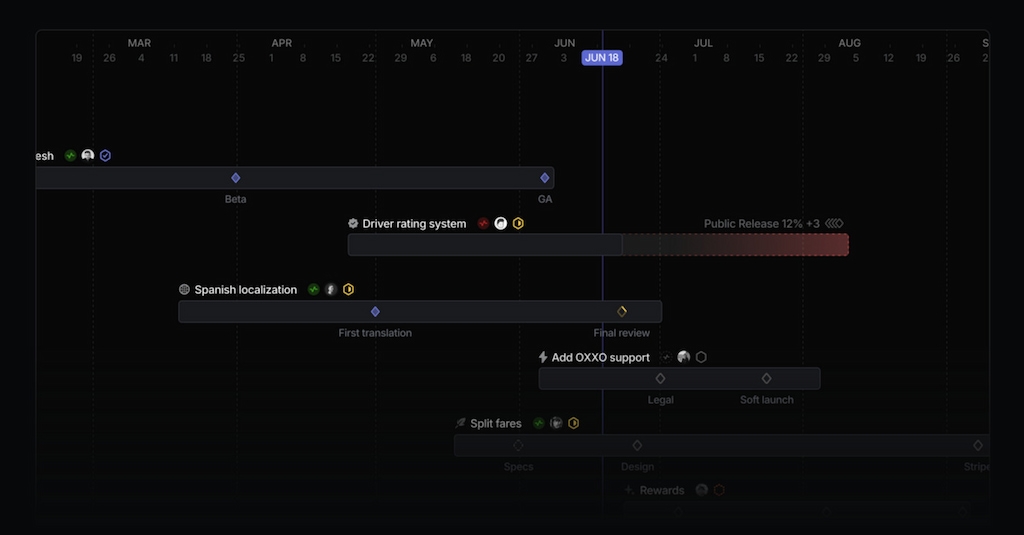
Verdict: Jira wins for analytics and reporting. Linear offers minimal reporting by design; teams rely on built-in cycle progress.
Integrations & APIs
Jira
- Atlassian Marketplace with thousands of apps.
- Native integrations (Everhour, Slack, Bitbucket, GitHub, Microsoft Teams, ServiceNow, Confluence).
- REST API for custom integrations.
Linear
- Linear integrations: Everhour, GitHub, GitLab, Slack, Figma, Sentry, Zendesk, Zapier.
- GraphQL API for custom integrations.
- Fewer native integrations, but Zapier and API fill gaps.
Verdict: Jira has a mature ecosystem. Linear focuses on quality rather than quantity—fewer integrations but enough for most dev teams.
Pricing & plans
Jira Cloud pricing
- Free: Up to 10 users; limited storage, basic support.
- Standard ($7.75/user/month): 250 GB storage, automation for a single project.
- Premium ($15.25/user/month): Unlimited storage, global automation, Advanced Roadmaps, more support.
- Enterprise (custom pricing): SAML SSO, audit logs, enterprise SLAs.
Linear pricing
- Free: Up to 10 users.
- Standard ($8/user/month): Unlimited users, priority support, team features.
- Plus ($12/user/month): SAML SSO, custom themes, guest accounts, audit logs.
Verdict: Pricing is similar. Jira’s Premium tier is more expensive but includes advanced planning. Linear’s Plus tier suits mid-market teams needing SSO.
Pros and Cons
✅ Jira pros
- Highly configurable—custom fields, workflows, rules.
- Robust reporting and analytics.
- Handles complex dependencies and large projects.
- Scales for enterprise needs.
- Mature integration ecosystem.
❌ Jira cons
- Learning curve; can be overwhelming.
- Performance may lag with large setups.
- Configuration management can be time-consuming.
- The interface is less modern than newer tools.
✅ Linear pros
- Fast, responsive UI with keyboard shortcuts.
- Opinionated workflows promote consistency.
- Offline mode with desktop app.
- Roadmaps and cycles encourage structured planning.
- Less overhead—minimal configuration.
❌ Linear cons
- Limited customization (no custom fields, limited statuses).
- Focuses on developer teams; less suited for cross-functional or non-tech teams.
- Reporting and analytics are basic.
- Fewer integrations.
Use Cases: Which Teams Should Choose Which Tool?
- 🛠 Agile software teams → Choose Jira for custom workflows, complex hierarchies, dependencies, and detailed reporting.
- ⚡ Startups & product teams → Choose Linear if you want speed, minimal setup, and a clean, fast interface.
- 🏢 Enterprises & regulated industries → Choose Jira for advanced security, compliance features, audit trails, and enterprise support.
- 🎨 Design & marketing teams → Jira works better with Figma, Adobe, Confluence, and marketing templates. Linear doesn’t cover non-dev tasks as deeply.
- 📊 Teams needing analytics → Jira has comprehensive dashboards and reports, while Linear’s reporting is basic.
Time Tracking & Productivity: Linear vs Jira
Native time tracking
- Jira: No native time tracking in free/standard plans. Atlassian’s “Time Tracking” module exists but requires configuration or add-ons. Third-party apps like Tempo or Harvest integrate via Marketplace.
- Linear: Does not include time tracking. Teams rely on third-party tools or internal processes.
Integrations with time tracking tools
Both Jira and Linear integrate with time tracking applications via APIs or connectors. For example:
- Everhour: Adds a timer button in tasks, allowing users to log time directly within Jira or Linear. Time entries sync back to Everhour’s time tracker for reporting and budgeting (check out our Linear time tracking integration and Jira time tracking integration).
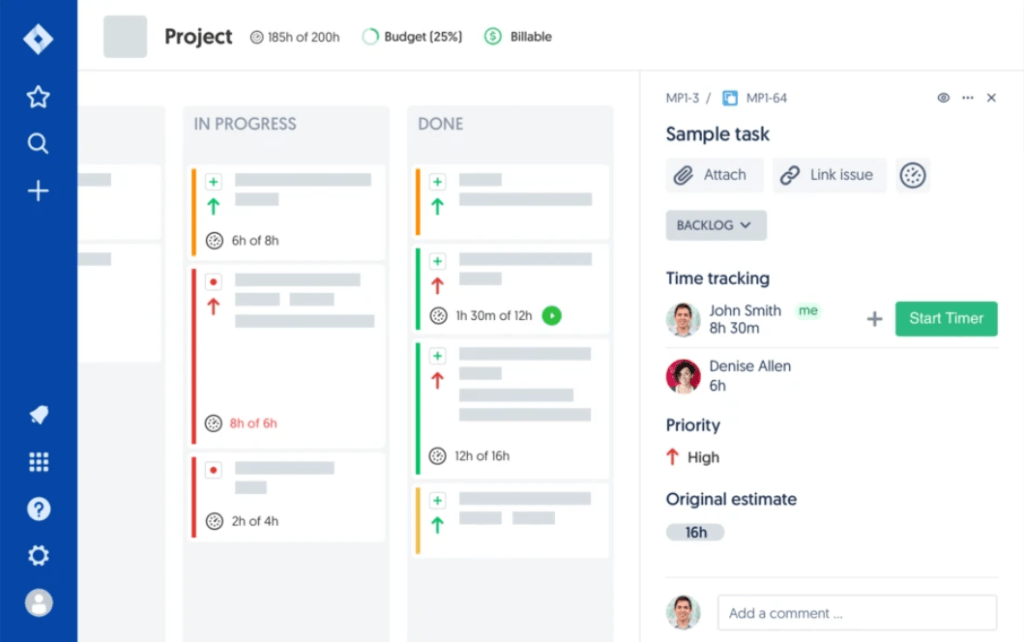
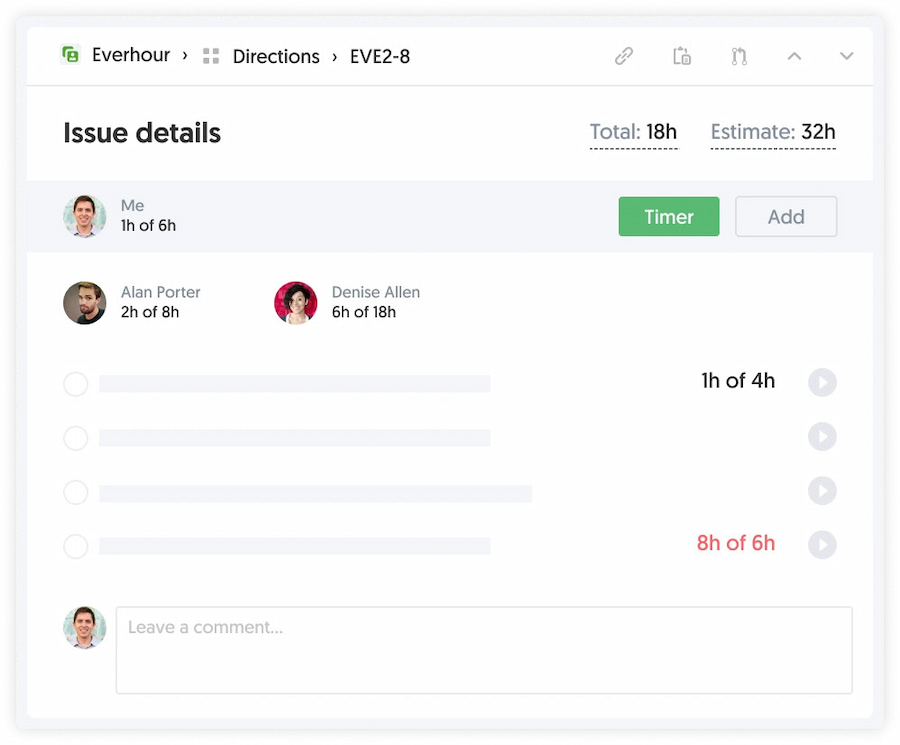
- Tempo Timesheets (Jira only): Popular paid add-on for detailed time tracking and cost management.
- Clockify, Toggl: Chrome extensions allow time capture within Jira or Linear tasks.
Why Everhour matters
Everhour focuses on simple time tracking integrated with project management. Here’s how it helps:
- Embedded timers: Everhour places a timer within the Jira or Linear issue view. Users track time without leaving their workflow.
- Budgets & estimates: Set budgets per project or issue. Everhour alerts you if you’re nearing limits.
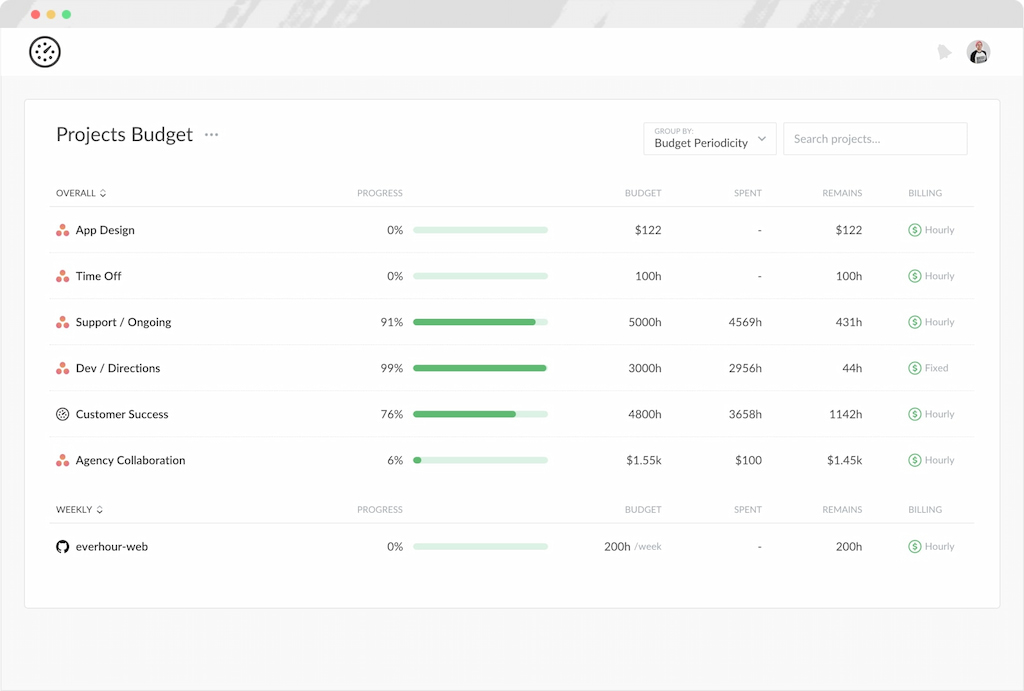
- Detailed reports: Export time per task, project or team member. Combine with Jira or Linear data for cost analysis.
- Invoicing & payroll: Generate client invoices and timesheets.
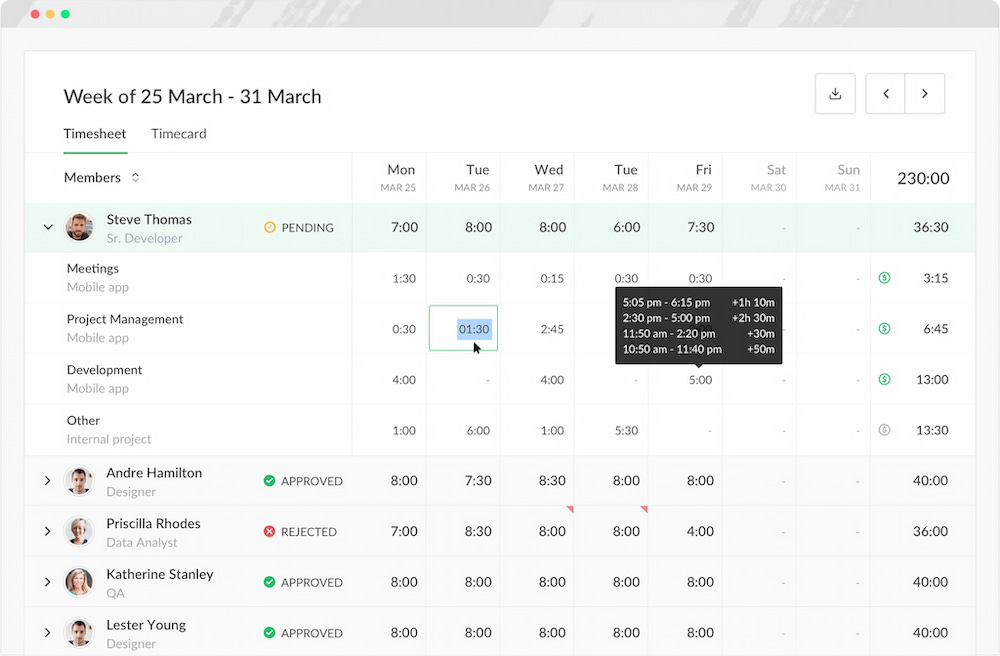
- Privacy-friendly: No screenshots or activity monitoring—only time logged.
Example use case: A startup uses Linear for issue tracking. They integrate Everhour via a browser extension. Developers log time as they move tasks through cycles. Project managers monitor time spent vs estimates, ensuring cycles remain on schedule. If issues consistently exceed estimates, they adjust planning.
Workflow Integration Tips
- 🚀 Onboard gradually → If migrating from Trello or spreadsheets, start with a pilot team.
- 🛠 Define workflows → In Jira, document processes and avoid endless statuses; in Linear, adopt cycles and set sprint length.
- ⏱ Integrate time tracking early → Use tools like Everhour to track effort and refine estimates.
- 📂 Use templates → Jira offers Scrum, Kanban, and service templates; Linear relies on cycles to create rhythm.
- 🔔 Customize notifications → Prevent alert fatigue by choosing which comments or changes trigger alerts.
- 🤖 Leverage automations → Jira supports automation rules; Linear is lighter here, so rely on habits like regular backlog grooming.
FAQs
Which is easier to learn—Linear or Jira?
Linear is generally easier. It features an intuitive UI and limited configurations. Jira has a steeper learning curve due to its flexibility, but Atlassian offers templates and guided setups.
Can Linear handle non-engineering projects?
It can, but its limited custom fields and statuses may frustrate marketing or HR teams. Jira offers specific templates for business projects.
Is Jira too slow?
Early versions of Jira had performance issues. Atlassian has improved speed in recent releases. Cloud-hosted Jira scales well, but self-hosted instances need tuning.
Does Linear support Git integrations?
Yes. Linear integrates with GitHub, GitLab and Bitbucket. It automatically updates issues based on pull request status and commit references.
Is there an offline mode?
Linear offers offline support in its desktop app. Jira Cloud doesn’t have full offline capabilities; some third-party desktop clients exist.
Can I switch from Jira to Linear or vice versa easily?
Migrating requires exporting/importing issues via CSV. Jira’s data structure is complex, so mapping fields may be challenging. Linear offers import tools from Jira.
Which tool offers better mobile apps?
Linear’s mobile app is lightweight and focused on issue updates. Jira offers full functionality via its app but can feel slower.
Do Linear or Jira support budgeting?
Neither includes budgeting or time estimates natively. You’ll need third-party time tracking tools like Everhour or Tempo.
Is Everhour free?
Everhour offers a free plan with limited features. Paid plans start around $5/user/month. For integration with Jira or Linear, you need a paid plan to access budgets and reporting.
Do I need time tracking if I’m using Jira Premium?
Even with Jira Premium, you’ll need an add-on for detailed time tracking. Tools like Everhour or Tempo fill this gap.
Final Thoughts: Linear vs Jira
Choosing between Linear and Jira comes down to team size, work style, and customization needs. Linear is fast, minimalist, and great for start-ups or small tech teams that want to move quickly without extra complexity. Jira, on the other hand, is highly customizable, packed with reporting, and integrates with almost everything—ideal for larger or more complex projects, but with a steeper learning curve.
No matter the tool, time tracking and budgeting are critical. That’s where Everhour fits in—integrating timers into tasks, managing budgets, and generating reports. It’s especially useful for project-based teams where tracking effort and costs matters more than monitoring productivity.
Both tools will keep evolving. Linear may add features, Jira may get easier to use. The best choice is the one that supports your workflows, keeps projects on track, and makes teamwork smoother—not harder.
Besides Linear vs Jira, we also made comparisons of Linear vs Notion, Jira vs Freshservice, Notion vs Jira, Jira vs Monday, Jira vs Basecamp, Jira vs GitHub, and Linear vs Asana to see which of these PM tools is better suited for your specific needs! Also, make sure to check out our article on Linear project management!

